Fueling an Engine of Opportunity
October 26, 2021
By Adrienne Egolf
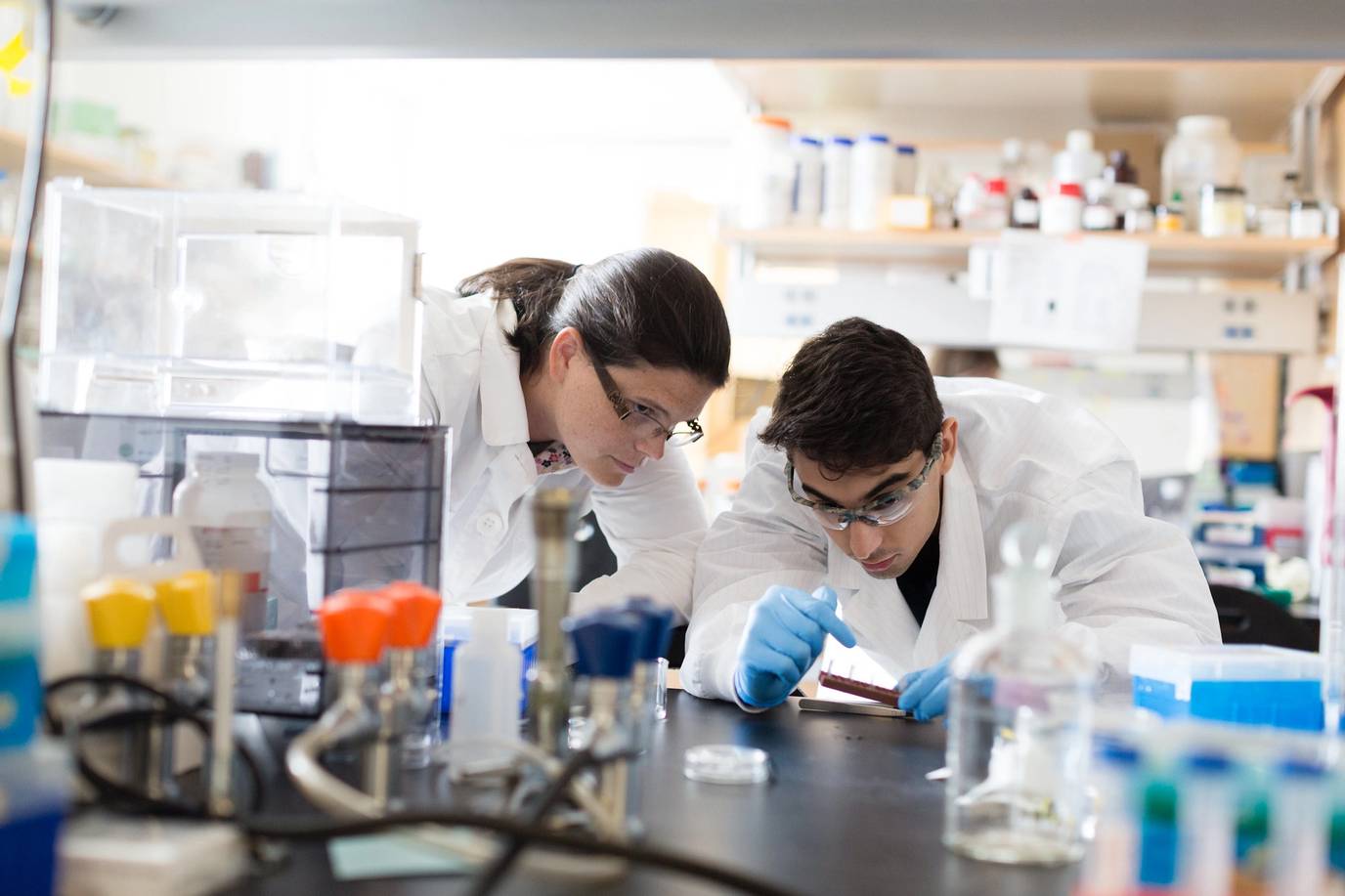
Supporting financial aid and scholarship opportunities at Rollins means that many more bright, promising students can join our community of learners.
Yassine Acoine ’19 spent a lot of his time at Rollins looking at root hairs through an atomic force microscope. The physics major spent a lot of time in peer groups exploring questions about how the world works. He spent a lot of time volunteering with friends as the community-service lead for his fraternity. What he did not spend a lot of time doing was thinking about how he would pay for college. As the recipient of an Alonzo Rollins Scholarship, Acoine—now a data scientist at Siemens—is one of the thousands of Rollins students whose success would not be possible without financial support.
Rollins is deepening our commitment to supporting standout students who are looking to make their dream of attending Rollins a reality. By reducing obstacles related to cost of attendance, our Brighter Together campaign aims to give talented Tars like Acoine life-changing opportunities to immerse themselves in the full Rollins experience and to continue to establish Rollins as a college that helps our students go farther faster, providing them the tools and resources to make an immediate impact in the next chapter of their lives.
To achieve these goals, we need your support. Help us make the Rollins education—and the transformational benefits it provides— more accessible than ever.
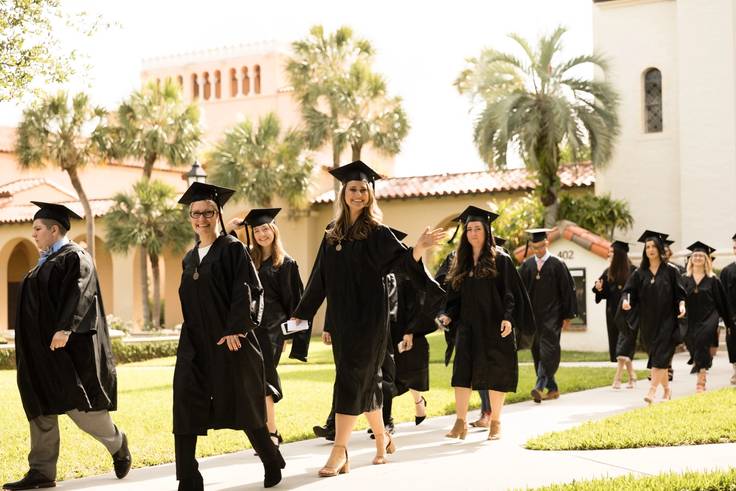
Meeting the Need to Succeed
For many students, receiving a Rollins education would be impossible without some degree of financial support.
Before 2020, close to 90 percent of Rollins students received financial aid, including loans. Since the start of the COVID-19 pandemic, however, more students than ever are relying on financial assistance. Among the incoming class of students for the 2021-22 school year, for example, that number has increased to 96 percent. In the College of Liberal Arts (CLA), the average aid package for first-year students with demonstrated need is $35,000, and nearly a quarter of students in fall 2020 received federal Pell grants.
The numbers speak for themselves. But for Steve Booker, associate vice president and director of financial aid, and his team of counselors who advise Rollins students on financial aid from admission to graduation, the story of financial aid goes beyond numbers on a spreadsheet.
“Each dollar that we can provide helps students reach their dreams,” says Booker. “We are able to recruit and retain an academically strong, diverse student body, which enables learning to occur both in and outside the classroom. Donors are providing the means for students to immerse themselves in the full Rollins experience, which makes an incredible impact on the Rollins community as well as globally as students graduate and go on to pursue meaningful lives and productive careers.”
Teasa Mays, assistant director for diversity and inclusion in the Office of Admission, is passionate about the unique opportunities that stem from need-based financial aid, stressing the importance of Rollins’ commitment to this kind of student support.
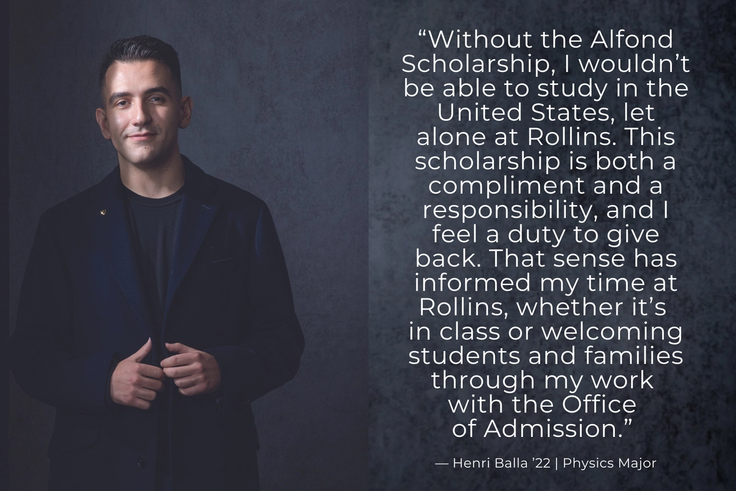
“Being able to walk away from a four-year education debt-free is super important for students from certain backgrounds,” she says. “Everyone should have access to college and higher education. The scholarships we offer are an opportunity to come to Rollins, a name that is known for rigor within the community. That’s an opportunity many wouldn’t have had without a scholarship.”
That is certainly true for Acoine. He credits Rollins’ personalized learning environment and deeply caring professors for helping him chart his path to success.
“There was a big focus on problem solving,” he remembers. “My professors were thoughtful about not just feeding us information but helping us develop critical thinking, which is something that helps me a lot in my position now.”
But those are opportunities he nearly missed out on. “I got accepted to Rollins and two other larger, prestigious schools. The deciding factor was the scholarship I received.”
Thanks to that financial assistance, Acoine proudly graduated from Rollins debt-free and now spends his days architecting cloud-based solutions in automation and data analysis at Siemens, one of the world’s largest technology companies.
“I am grateful for Rollins,” he says. “It was a different experience from my peers at other colleges because of the networking and the people I met. The opportunities can be a lot more restrictive at bigger schools. Most colleges don’t allow freshmen to do collaborative research in the way that I was allowed to at Rollins.”
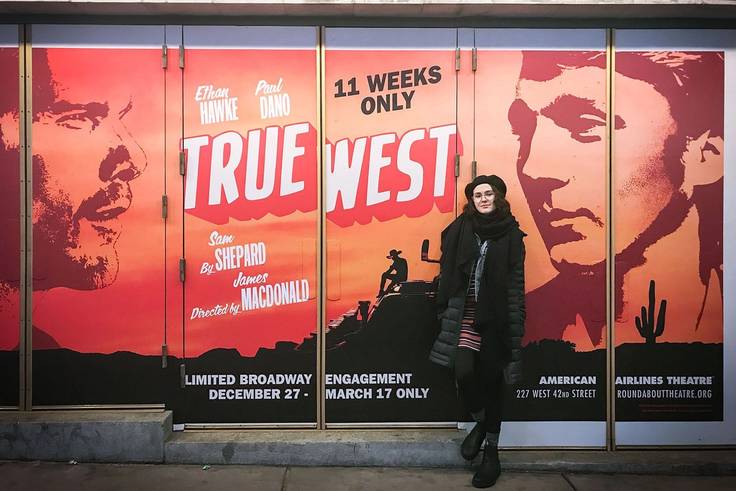
Freedom to Explore
For students like Acoine, whose path was permanently changed for the better thanks to his Rollins scholarship, financial aid is transformational. Kathleen Capdesuner ’17 grew up just 40 minutes from the Rollins campus, but the idea of actually attending Rollins was a fanciful notion until she earned a Priscilla Parker Scholarship to study theater.
“I knew Rollins had a great study abroad program,” she says. “But it wasn’t something I thought about as an option for myself. It wasn’t until I went to school there that I realized it could be a reality.”
Thanks to the financial support she received, Capdesuner studied abroad three times, completing semesters and field studies in both London and Edinburgh. Today, she lives in New York City pursuing her theater career as a writer and director fresh off a fellowship at the Roundabout Theatre Company. She says that without any financial help, she would have been severely limited in the opportunities she could have taken advantage of at Rollins.
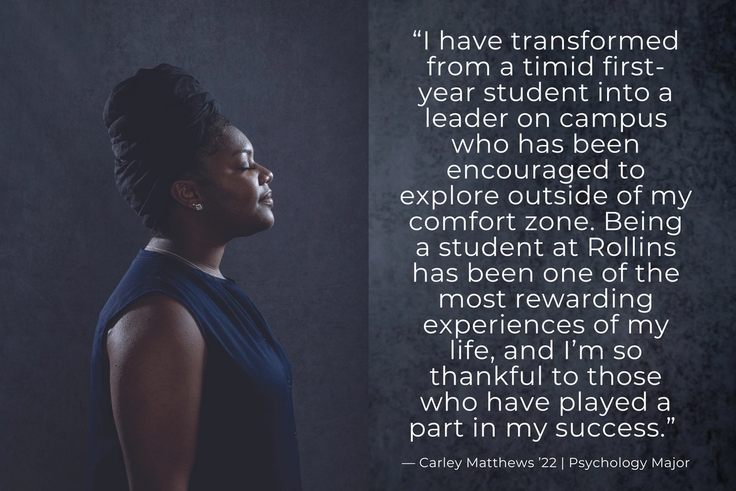
“The scholarships I received at Rollins helped me get the college career and experience that I wanted,” she says. “Without it, I wouldn’t have been able to get a full liberal arts education.”
Thanks to Rollins’ premier Alfond Scholarship—which covers full tuition, room, and board for four years—Caleb Archuleta ’18 now sees the world differently.
“[The Alfond Scholarship] gave me the financial flexibility to pursue my dreams that oriented around service,” he says. “I wasn’t worried about repaying loans or having massive debt hanging over me for decades.”
Archuleta majored in international business and minored in Middle Eastern and North African studies. He had the freedom to pursue career-defining internships at companies like Boeing and an immersive language program in Morocco because he wasn’t burdened by financial woes. And those early successes set him up for additional scholarships: a Boren Scholarship to study Arabic and a Fulbright Scholarship to study international security at the University of Bristol.
Archuleta is grateful for what he calls the “huge gift” of his merit-based scholarship.
“It afforded me the opportunity to work with this highly crafted and motivated group of individuals,” he says, “to attend retreats, volunteer, train for a triathlon—to create my best self and contribute as much as I could.”
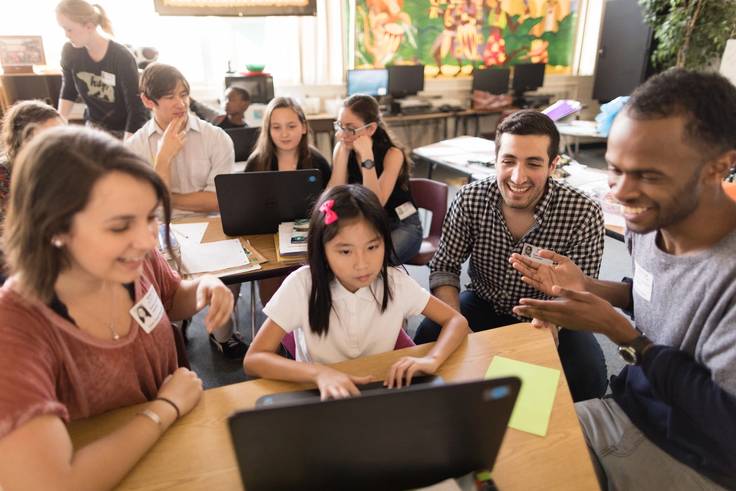
Amplifying Your Impact
Robert W. Campbell Jr. ’81 still remembers planting sunflowers in front of the environmental studies building as a Rollins student.
“I did it because I loved botany and I loved planting,” he muses. But the flowers are just one small example of Campbell’s larger ethos: “I say to our kids all the time: Make your mark. I don’t care where, I don’t care when, but try your best to make a difference.”
Campbell, whose own Rollins education was supported by financial aid, recently established a financial aid endowment.
“A scholarship not only meets the financial need,” he says. “It can give you the keys to open doors that you can’t even predict, that you don’t even know exist. It can open up new areas of the world that you can’t even see.”
Take Karina Barbesino ’19, for example, who earned a prestigious Boren Scholarship as a sophomore, a Critical Language Scholarship as a junior, and a Fulbright Scholarship as a senior. Barbesino’s Rollins journey gave her the opportunity to explore how cyber security relates to human rights, a passion she developed through Rollins’ interdisciplinary curriculum. Today, she’s a researcher at Harvard’s Belfer Center for Science and International Affairs focusing on America’s policy with China.
Scholarship dollars not only helped Sam Sadeh ’18 attend Rollins, but they also transformed the educational trajectory of dozens of fourth-graders who participated in the after-school coding program that he designed. Julian Grundler ’18 had the opportunity to conduct original research on nanoparticles alongside chemistry professor Ellane Park, eventually landing a spot in a PhD program at Yale researching potential cancer treatments. And Michael Gutenshon ’18, whose Rollins experience included three internships at NASA, is helping shape the future of computer-human interaction at Apple.
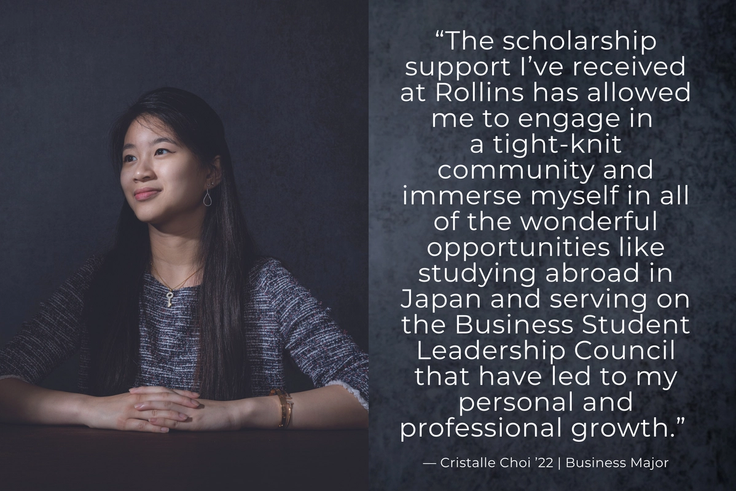
These examples all point to the personal impact of financial support, but they reveal another truth as well: In many cases, that personal impact is just the beginning. The focus on community-based learning and global citizenship at Rollins means that every dollar that goes to a student’s education also supports a globally minded mission that, like Campbell’s flowers, has the potential to bloom for decades after the first seeds are planted.
That is partly why Campbell and his wife, Diana, set up their endowment to specifically support students in the science and engineering areas.
“Our vision is that someone else who has passion about something that they love has the ability to learn and apply it to their life,” says Campbell. “The world needs some incredible insight and problem solving and passionate individuals for environmental research. Maybe somebody who receives this scholarship will be the next David Attenborough—sharing, informing, and educating the world and hopefully creating solutions to some of our biggest problems.”
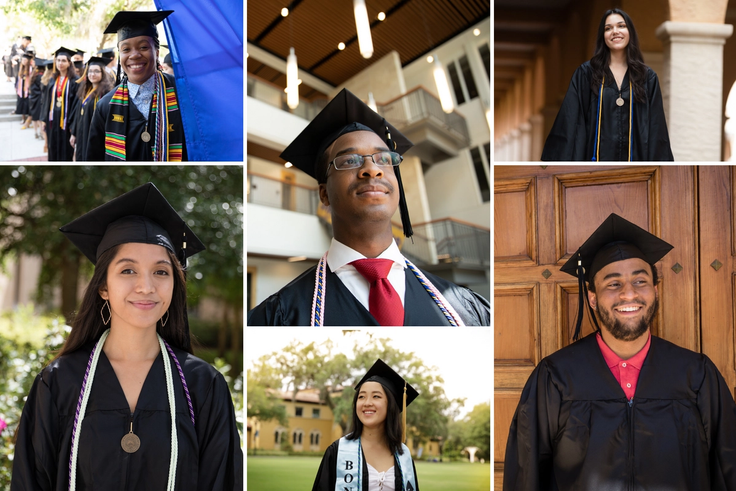
Driving Diversity
When Mays is recruiting students for need-based scholarships, she’s not necessarily thinking about building a culture of diversity, equity, and inclusion on campus—it’s simply woven into the work she does every day.
“Diversity is a way of life,” she says. “In every facet of our lives, it’s important to hear different perspectives from different social, economic, and cultural backgrounds.”
She stresses that this is core to the Rollins mission—creating global citizens who use diverse perspectives to devise creative solutions to the world’s toughest challenges.
Donna Lee, Rollins’ newly appointed vice president of student affairs, points out that this work also goes beyond the Rollins mission.
“The work of creating true inclusivity on our campuses is what I would name as the moral imperative of this time,” she says, positing that in the wake of a global reckoning with racism and injustice, diversity and inclusion has never been more salient or urgent for a college like Rollins.
Abby Hollern, director of Rollins’ Center for Inclusion & Campus Involvement, is also unequivocal when it comes to the value of diversity on campus.
“What I know to be absolutely true,” she says, “is that living and learning with diverse perspectives and people with differences in life experiences, identities, and thoughts—you grow.”
But for many high-performing students in marginalized communities, the opportunity to grow and learn at a school like Rollins is often unattainable. Ashley Williams ’18 ’22MPH was at her senior prom when she found out she’d earned a scholarship to Rollins through a partnership with the Boys & Girls Club.
Williams, who was an International Baccalaureate student in high school, applied to Rollins without really knowing how she’d pay for it if she got in. Her older siblings had exposed her to different college experiences; one went to a large state university, and one attended an HBCU (historically black college or university).
But at Rollins, Williams had the opportunity to thrive in a close-knit liberal arts environment. Her scholarship covered a study abroad program in London and a field study in the Dominican Republic. She also became one of the first student leaders of EMBARK, a cohort-based student development opportunity for students of underrepresented backgrounds.
“I am so proud to see that program blossom,” says Williams, who’s now back at Rollins pursuing a master’s in public health. “Many people in communities of color don’t know that Rollins can be affordable. EMBARK and the Black Student Union have helped expand diversity and erase the fear that ‘maybe there will be no one there who looks like me.’”
That is why increasing diversity is one of the chief goals of the financial support priority at Rollins. Trustee Rod Adkins ’81, who chose to set up a student-focused endowment centered on diversity, equity, and inclusion, explains the importance and potential compounding benefits.
“Really, diversity is a mechanism to allow everyone a chance to have a higher quality of life,” he says. “We all have the same basic needs. We all want quality health care. We all want to live in safe communities, to have good jobs and access to support systems. The role I play as a donor to Rollins’ scholarship program is to help elevate people to be able to compete for access to that opportunity.”
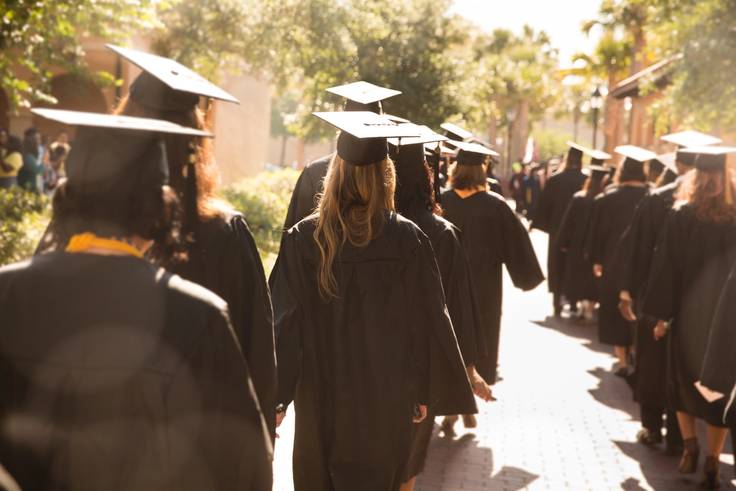
By the Numbers
Your gift has a compounding effect on the lives of our students, helping Rollins deliver the next generation of leaders and thinkers to create positive change in the world.
- 96% of students receive financial aid
- $83M annual aid available to Rollins students
- Top 10 in the nation for best value
- $35K average aid package for first-years with demonstrated need
- Top 50 in the nation for merit-based aid

Now is Our Time to Shine
Join the historic effort to invest in the people, programs, and places that prepare Rollins students to lead purpose-driven lives and prosper in productive careers.
Read More
July 15, 2024
Rollins College Computer Science Professor Discusses AI and the Future of Work
Daniel Myers, an associate professor of computer science at Rollins College, provides expertise on how AI is changing the nature of work.
July 08, 2024
Gunter’s Book on Climate Change Receives Multiple Awards
Political science professor Mike Gunter’s book Climate Travels recently won awards from Foreword magazine and the American Library Association.
July 03, 2024
Rollins Welcomes Dean Lauren Smith
The 32789.com interviewed Lauren Smith, the new Dean for the Hamilton Holt School about her experience with adult education.
